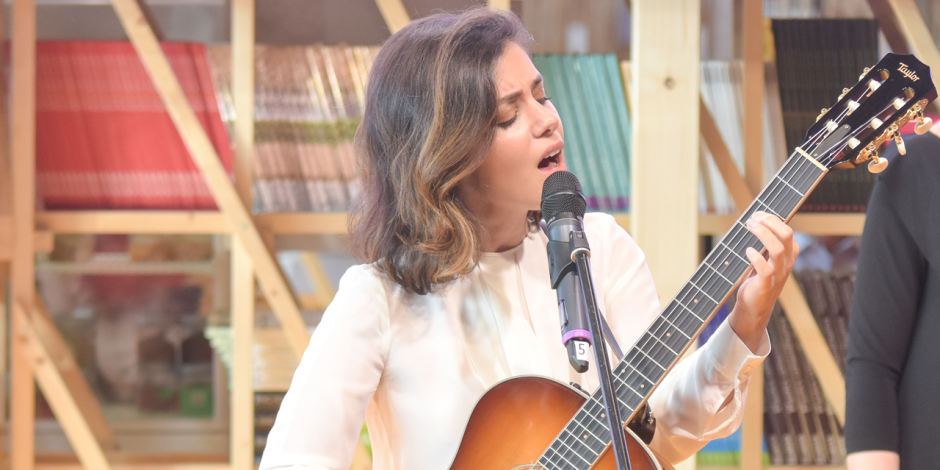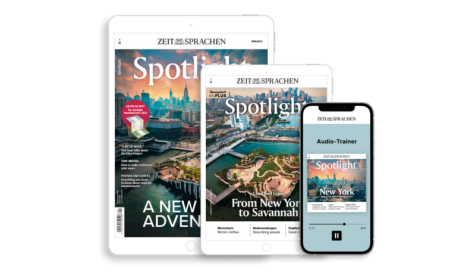Starten Sie den Audio-Text
Mit dem Audio-Player können Sie sich den Text anhören. Darunter finden Sie das Transkript.
Transcript: Katie Melua – bringing language to life
Katie Melua is one of Britain’s most successful recording artistMusiker(in)recording artists of the 21st century. She made her musical debut in 2003 and has gone on to sell over 11 million albums. Melua also knows about the difficulties of learning a new language. In the first part of the interview, she describes moving to the UK from Georgia when she was eight years old.
Maybe I could just start with what my childhood was like in Georgia because Georgia, for some people that might know, is on the other side of the Black Sea. It borders Turkey, Azerbaijan, Armenia and then the Caucasian Mountains sort of to envelope sth.etw. umschließen, umgebenenvelope it on the northern side. So the land itself is incredibly dramatic with the mountains, with many, many rivers. It’s also very fertilefruchtbarfertile and I always thought that the Georgian language reflected the landscape itself because the language itself is very dramatic. So it has some really strange and deep sounds like the letters “gh”, letters like “ts” and “h”. It’s as gutturalkehligguttural as say Dutch is, and it’s as operaticopernhaftoperatic as Italian is. I hear this with some languages quite frequently where, and we have this a lot, me and my mum will be talking about something very normal, very regular, but if an English friend to overhearzufällig hörenoverhears that conversation, they think we’ll have been arguing or something terrible has happened because it’s just so dramatic. So, this is my mother tongue, and this is the language I was born into and it’s my first language.
It started as a love-hate relationship with the English language for me
I started to learn and interact with English when I went to school in Georgia, and I had some very basic English lessons. And this came from, of course, the fall of the Soviet Union in the early ’90s, and Georgia becoming independent as a country and wanting to be a part of the Western world. And English I guess represented… because language isn’t really isolated right? It’s part of the contextZusammenhangcontext that it sits in. And English represented all those new things we saw on the TV, like these great American films, the advertising for things like chocolate barSchokoriegelchocolate bars, for Coca-Cola, for these sort of Western brands. So there was definitelysicherlich, ganz bestimmtdefinitely this great desire to to engage with sth.sich mit etw. beschäftigen, sich auf etw. einlassenengage with the English language and there was great value in learning the English language, so… but I was six years old, seven years old and learning English felt very much like a chorelästige Pflihtchore. It was very tediousmühsamtedious, and it was very slow. I mean I had an English tutor, he would come once a week and I just I really didn’t like learning English, and one of the things that to botherstörenbothered me about the English language was the fact that the alphabet, every single letter didn’t represent every single sound. And this was in high contrast to Georgian where the alphabet is phonetic. So every single sound that you speak in Georgian is represented by a letter, so you cannot get the spelling wrong whereas in English I would be to baffleverwirren, störenbaffled by why the letter “a” had like four or five different sounds to it, and I just thought this is ludicrouslächerlich, groteskludicrous. So it started as a love-hate relationship with the English language for me. And then, of course, in 1994 my dad was very lucky and fortunate to get a job in Belfast, in Northern Ireland, and I say lucky because at that time Georgia was really on its knees in terms ofwas ... betrifftin terms of its economy, its infrastructure and so we were able to move to the West basically.
So there I am, eight-year-old kid, now living in the UK with my one-year-old brother and my mum, who spoke very little English. And my dad had spent about six months in Belfast just seeing what the job and the life out there would be like and then he sent for us. So I had one experience which formed me immensely. And it was to do with how I to acquire sth.sich etw. aneignenacquired the English language. I am so fortunate for it because it was basically the experience when the English language sort of lit up for me and it’s almost bizarregroteskbizarre to describe it. So I moved to Belfast and I know some words, and I can say things like “I am Katie”, “I am seven years old” – all those regular things you learn when you’re trying to learn a foreign language. And then as an eight-year-old I’m in the school and I’m trying to understand a completely new culture, a completely new situation that I’m in.
I remember one funny sort of episode was I got given some brown paper and some new textbookLehrbuch, Schulbuchtextbooks. And the teacher is explaining something to me, and I have absolutely no idea what she’s saying and she tries to… she shows me the book and she shows me the brown piece of paper, and I go home and I’m quite upsetaufgeregtupset and I say to Mum, “I don’t know what to do with this.” And Mum’s like, “What do you think you ought to do with it?” And I was like, “I don’t know, maybe I’m meant to cut out shapes and make stars and hearts and shapes out of this brown piece of paper. Maybe ones from the book.” So I go to the school the next day, and I’ve taken my star shapes and heart shapes from the brown piece of paper and the teacher sort of thinks this is really silly because actually the paper was to wrap the textbooks. So she shows me the other students’ work and she’s like, “You see? This was for wrapping the textbooks.” And I’m like “Oh, OK!” That was one like major lost in translation moment and then eventuallyirgendwanneventually you just sort of slowly, slowly kind of have lesson after lesson and just trying to, I don’t know, I was just trying to to immerse oneself in sth.sich in etw. vertiefenimmerse myself in it. But essentiallyim Prinzipessentially the language remained... like I could hear certain words, and I would sort of to grasp onto sth.etw. begreifengrasp onto that word, and I think they’re talking about animals in the zoo because we’ve got pictures of lots of animals.
There really was this moment of complete clarity
But it wasn’t until three months of living in Belfast, and I was walking home with some friends from the school. And I felt that… and by this point the more words that were lit up in my mind that I understood were sort of growing bigger and bigger, that list was growing bigger and bigger, but it was still kind of like to fumbleumhertastenfumbling in the dark of this English language. And there was something that my friends said, and it sounded like they were slightly to take the mick out of sb.jmdn. auf den Arm nehmentaking the mick out of me, and I just remember having this great surgeDrangsurge and desireWunsch, Bedürfnisdesire to understand the language, to sort of really, fully understand it. And then this strange thing happened where it was as if the English language just lit up in my mind. And there really was this moment of complete clarity and it was quite remarkable. I mean, of course, after that there were moments where I didn’t quite understand certain sentences and I’d have to ask please explain what this means but there was a real visceraltiefsitzendvisceral moment where I remember the English language suddenly… you know it’s like the sort of the mechanics of joining the words up in my brain had sort of to liquefysich verflüssigenliquefied and the mechanism had sort of disappeared and it was beginning to be fluid and it was a beautiful experience.



